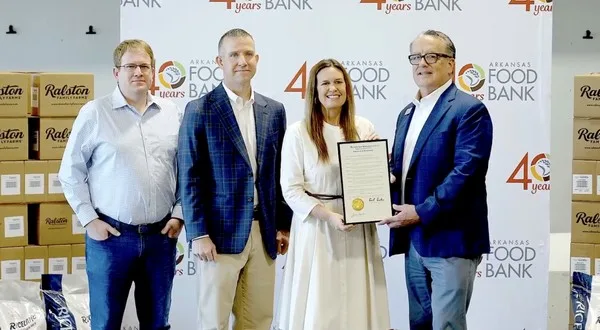
Rice farmer Mark Isbell, Agriculture Sec. Wes Ward, Gov. Sarah Huckabee Sanders and Arkansas Food Bank CEO Brian Burton (l-r) celebrate a donation of 284,000 pounds of rice to mark National Rice Month during a press conference in Little Rock on Sept. 18, 2024. (Screenshot from livestream)
Members of the state’s rice industry donated nearly 284,500 pounds of rice to the Arkansas Food Bank Wednesday to mark National Rice Month.
The annual donation occurs each September during Hunger Action Month and is equivalent to 4.5 million servings this year. The Arkansas Food Bank will distribute the rice as part of efforts to address hunger in the Natural State, where roughly one in five Arkansans face food insecurity, officials said at a press conference in Little Rock.
At a rate of 19%, Arkansas has the highest rate of food insecurity in the nation, according to a new U.S. Department of Agriculture report, and that’s “not the place we want to be,” Gov. Sarah Huckabee Sanders said.
“For us to be such great leaders in agriculture, we should be able to address this problem,” Sanders said.
Agriculture is the state’s largest industry and rice is a big part of that, accounting for more than 25,000 jobs and creating an economic impact of $6 billion, rice farmer Mark Isbell said. Arkansas grows more than half of the nations rice, and about 1.4 million acres in 40 of the state’s 75 counties will be used for rice production this year, Isbell said.
Agriculture Secretary Wes Ward said the state’s rice industry is also known throughout the world and noted that Indonesia’s minister of agriculture recently visited Arkansas for a first-hand look “because we are known as the best rice producers in the world.”
Ward said the local rice industry is committed to serving Arkansans in need, in spite of difficulties producers have faced recently.
“The farming economy has been challenging the last couple years – you see high inflation costs, high input costs, low commodity prices,” he said. “But even during those challenges, the rice industry and our ag industry continue to give back to those who are in need.”
The state’s rice industry has increased its annual donation to the Arkansas Food Bank in recent years, with its 2024 contribution more than doubling the roughly 141,000 given in 2019.
Sanders said steps have been taken to address the state’s challenges with food insecurity, including legislation approved by Arkansas lawmakers in 2023 that permits low-income students who qualify for reduced-price meals at school to receive them for free.
Arkansas also participated in a new federal food assistance program this year called the Summer Electronic Benefit Transfer, or Summer EBT. The program, modeled after a similar service implemented during the COVID-19 pandemic, provided qualifying students with $120 on a pre-loaded card to use for groceries during the summer school break.
Thirteen states with Republican governors opted out of the Summer EBT program, which Sanders on Wednesday described as “a great partnership with our federal government.”
Arkansas Food Bank CEO Brian Burton said expanding participation in federal nutrition programs, which is lagging, could help Arkansas “get off of that wrong end of the ranking as a state.”
There’s a clash of affluence and poverty in Arkansas where rice is exported to 100 countries, but the state is the hungriest in the nation, Burton said.
“The paradox is not lost on any of us… but as has been noted, we have the infrastructure, we have the commitment, the know-how, the ingenuity, the imagination, and we are determined to end this ranking that we’re on, and not just for pride, but for morality and humanity,” he said. “We all owe that to each other. No one should go to bed hungry in our state.”
To view this story, or more news updates from Arkansas Advocate, click here.
WebReadyTM Powered by WireReady® NSI










